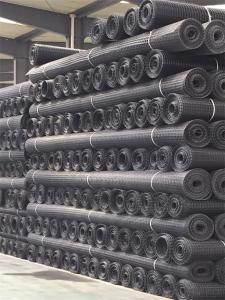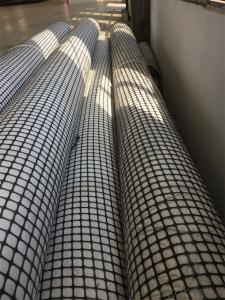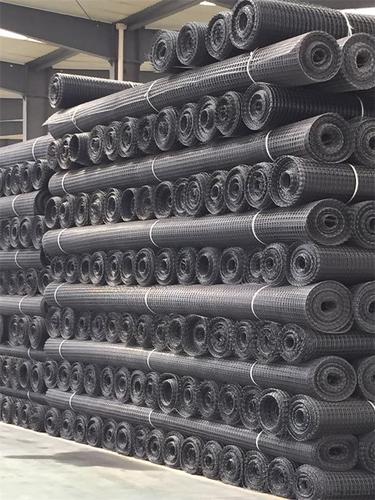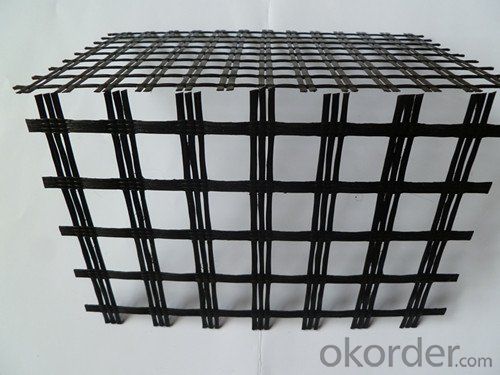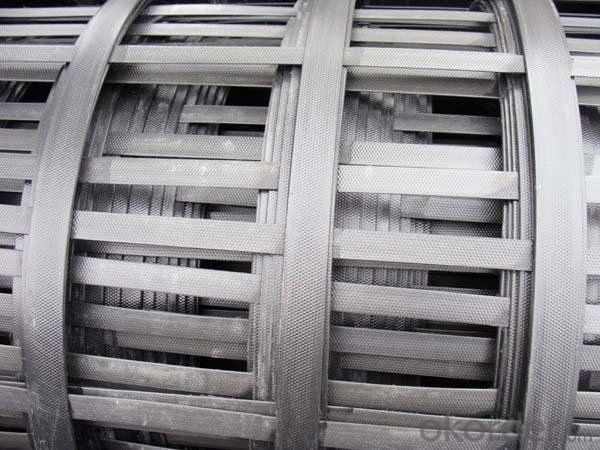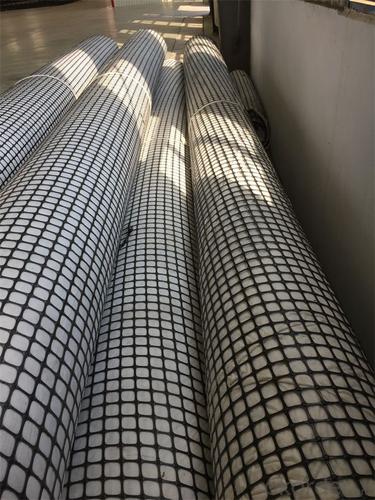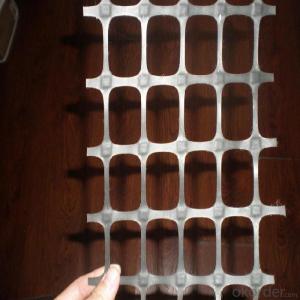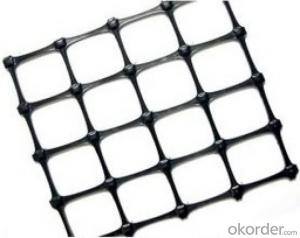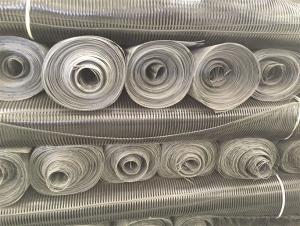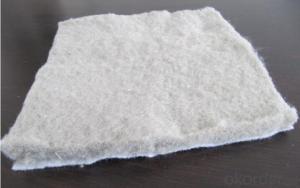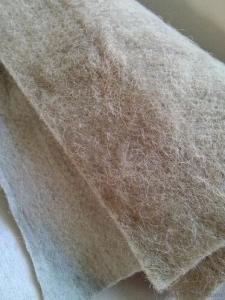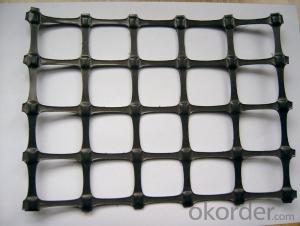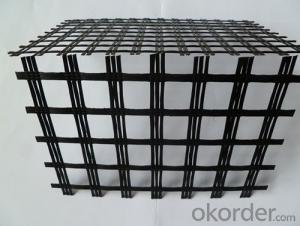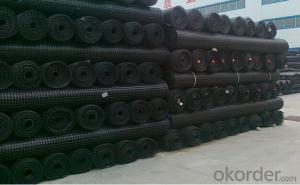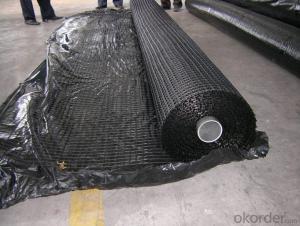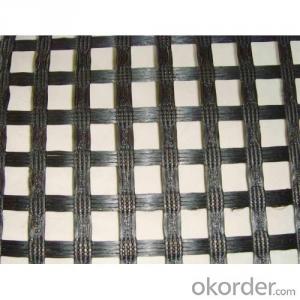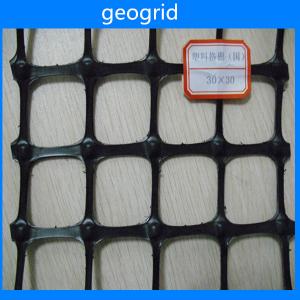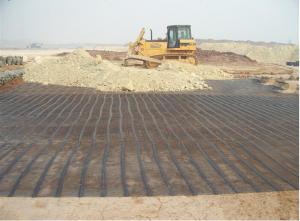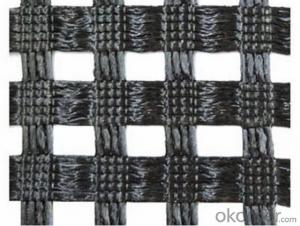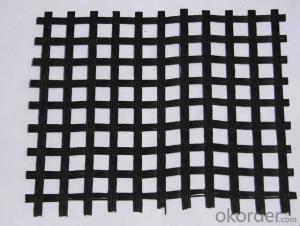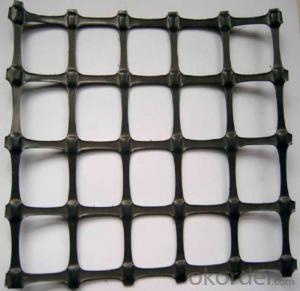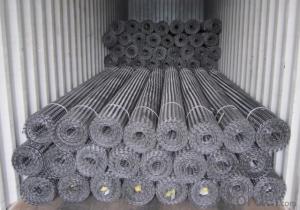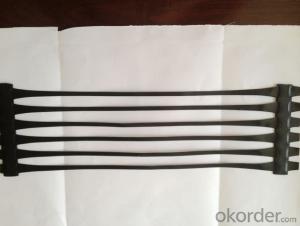Road Reinforcement Geogrids - Tensar Biaxial Plastic and Fiberglass Geogrid Prices
- Loading Port:
- Qingdao
- Payment Terms:
- TT or LC
- Min Order Qty:
- 5000 m²
- Supply Capability:
- 2000000 m²/month
OKorder Service Pledge
OKorder Financial Service
You Might Also Like
Specifications of Geogrid:
Warp knittedpolyester geogrid
1.Material:Polyester
2.Tensile strength:80KN/M
3.Mesh size:25.4mm*25.4mmm
4.Size:2.5m*50Meter
Warp knitting geogrid is high strength fiber or polyester industrial filament, the grid cloth after the warp knitting direction detection,
the PVC coated processed into geogrid, have "soft steel fiber," said.The warp knitting is also known as polyester geogrid geogrid or
the warp knitting polyester geogrid, is also one of geosynthetic materials commonly used in civil engineering.
Applications of Geogrid:
Make reinforce treatment for various kinds of soft soil foundation to evenly distribute load stress and reduce uneven settlement,
not easy to generate static electricity, and flammability property good in the coal mine. It is easy to wash coal.
Used in highway, railway, airport and municipal project. Support in the recovery working face of coal mine and roadway in the coal mine.
Index Properties | Test Method | Unit | GG1515 | GG2020 | GG3030 | GG4040 |
MD TD | MD TD | MD TD | MD TD | |||
Polymer | -- | -- | PP | PP | PP | PP |
Minimum Carbon Black | ASTM D 4218 | % | 2 | 2 | 2 | 2 |
Tensile Strength@ 2% Strain | ASTM D 6637 | Kn/m | 5 5 | 7 7 | 10.5 10.5 | 14 14 |
Tensile Strength@ 5% Strain | ASTM D 6637 | Kn/m | 7 7 | 14 14 | 21 21 | 28 28 |
Ultimate Tensile Strength | ASTM D 6637 | Kn/m | 15 15 | 20 20 | 30 30 | 40 40 |
Strain @ Ultimate Strength | ASTM D 6637 | % | 13 10 | 13 10 | 13 10 | 13 10 |
Structural Integrity | ||||||
Junction Efficiency | GRI GG2 | % | 93 | 93 | 93 | 93 |
Flexural Rigidity | ASTM D 1388 | Mg-cm | 700000 | 1000000 | 3500000 | 10000000 |
Aperture Stability | COE Method | mm-N/deg | 646 | 707 | 1432 | 2104 |
Dimensions | ||||||
Roll Width | -- | M | 3.95 | 3.95 | 3.95 | 3.95 |
Roll Length | -- | M | 50 | 50 | 50 | 50 |
Roll Weight | -- | Kg | 39 | 50 | 72 | 105 |
MD denotes Machine direction. TD denotes transverse direction. | ||||||
Property of Geogrid:
1.) Improve roadbed bearing capacity,enlarge road lifetime.
2.) Prevent road collapse and crack
3.) Prevent soil and water loss in slope
4.) Could replace steel-plastic geogrid in coal mine.
FAQ:
1. How to order your geogrid ?
a). Tensile strength in warp & weft direction
b). Grid size
c). Width and length
d). Quantity
2. Payment term .
a) TT
b) LC AT SIGHT
c) cash
d) 30% contact value as deposit ,the blance 70% be paid after received the copy of bl .
3. Delivery time
a) 19-25 days after received your depsit .
4. What is MQQ ?
a) 2500 m2 as MQQ , we can also produce sample for you .
Geogrid Show:
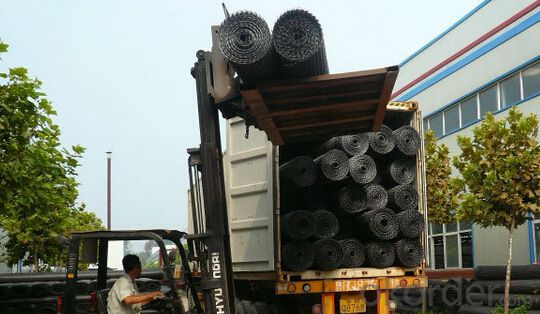
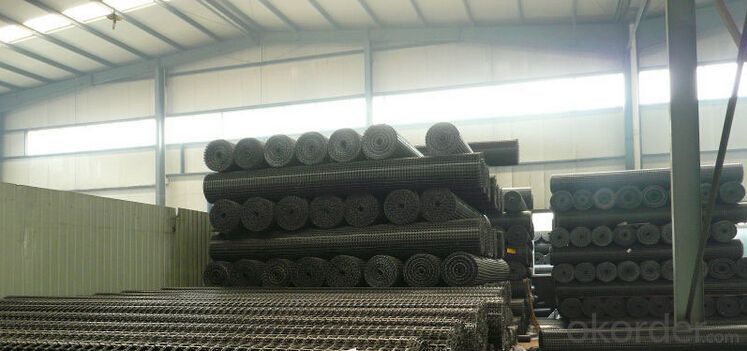
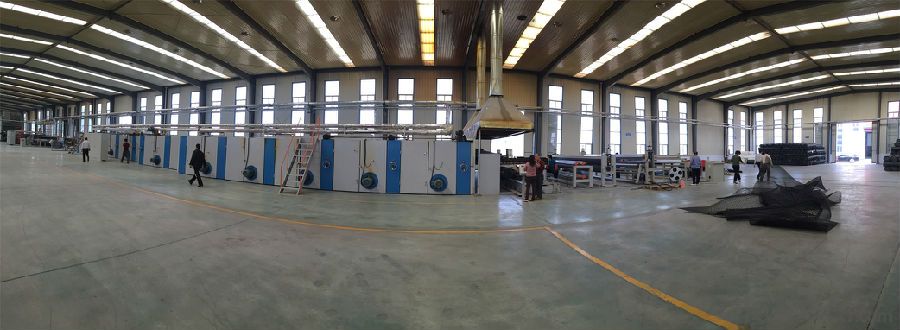
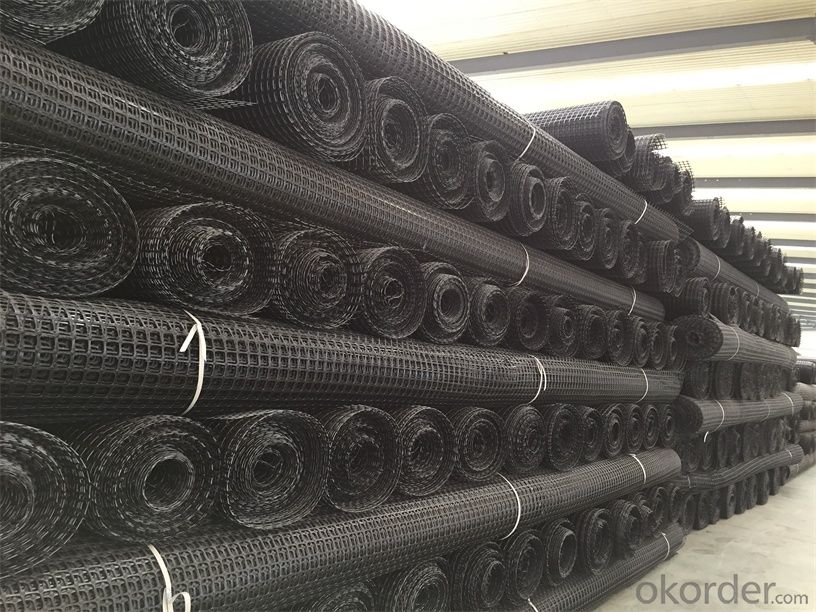
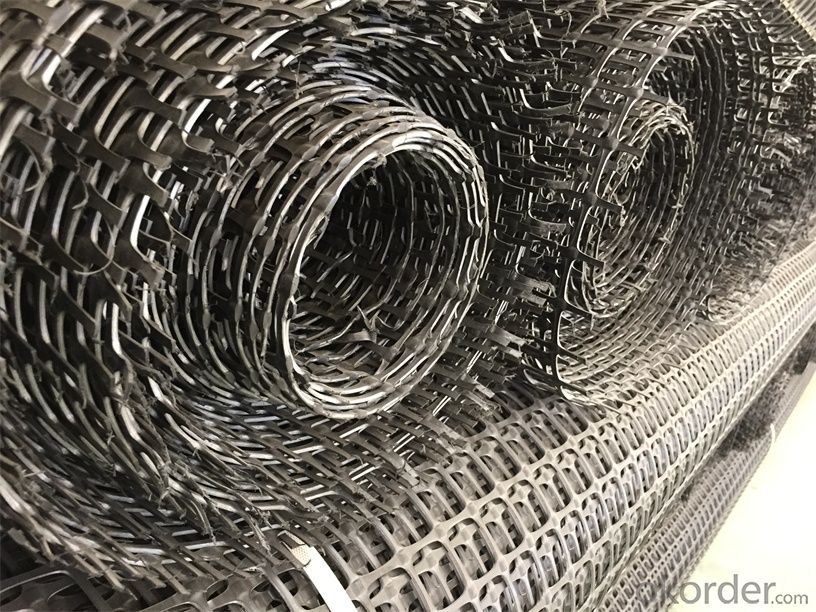
- Q: What are the factors that influence the design and selection of geogrids for reinforcement?
- There are several factors that influence the design and selection of geogrids for reinforcement. These include the type and characteristics of the soil, the specific application or project requirements, the anticipated loads or stresses on the geogrid, the desired design life and durability, and cost considerations. Additionally, factors such as installation conditions, site constraints, and environmental conditions may also play a role in determining the appropriate geogrid design and selection.
- Q: Geogrid tgsg45-45 what does it mean
- Geogrid TGSG45-45, two-way plastic geogrid 45KN, I hope to help you.
- Q: What are the advantages of using geogrids in ground reinforcement?
- There are several advantages to using geogrids in ground reinforcement. Firstly, geogrids provide increased stability and load-bearing capacity to the soil, making them beneficial for areas with weak or unstable ground. Secondly, they help prevent soil erosion, as the geogrids act as a barrier that holds the soil in place. Additionally, geogrids can reduce construction costs by allowing for the use of locally available, less expensive fill materials. They also facilitate faster construction times, as they are easy to install and require minimal excavation. Overall, geogrids offer a cost-effective and efficient solution for ground reinforcement projects.
- Q: What are the long-term maintenance requirements for geogrid-reinforced structures?
- The long-term maintenance requirements for geogrid-reinforced structures typically involve periodic inspections to ensure the integrity and stability of the structure. This may include monitoring for signs of erosion, settlement, or damage to the geogrid or surrounding soil. Additionally, regular maintenance activities such as vegetation control, sediment removal, and drainage management may be necessary to prevent potential issues and ensure the long-term performance of the reinforced structure.
- Q: Can geogrids be used in temporary construction applications?
- Yes, geogrids can be used in temporary construction applications. Geogrids are commonly used to reinforce soil and provide stability, making them suitable for temporary structures such as retaining walls, roadways, and excavation support. They can be easily installed and removed as needed, making them an effective solution for temporary construction projects.
- Q: Are geogrids suitable for reinforcing slope stabilization mats?
- Yes, geogrids are suitable for reinforcing slope stabilization mats. Geogrids are commonly used in conjunction with slope stabilization mats to provide additional strength and stability to the soil. They help distribute loads and prevent soil erosion, making them an effective solution for reinforcing slope stabilization mats.
- Q: How do geogrids improve the stability of shorelines?
- Geogrids improve the stability of shorelines by providing reinforcement and structural support to the soil or sediment. They are commonly used to prevent erosion and maintain the integrity of coastal areas. The geogrids act as a barrier that holds the soil in place, effectively reducing the impact of wave action and water currents. This reinforcement enhances the stability of the shoreline and helps to prevent the loss of soil or sediment, ultimately protecting the coastline from erosion.
- Q: How do geogrids enhance the performance of flexible retaining structures?
- Geogrids enhance the performance of flexible retaining structures by providing reinforcement and stability to the soil. They distribute the loads more evenly, reducing the stress on the structure and increasing its overall strength. Geogrids also prevent soil erosion and improve drainage, ensuring the long-term integrity and durability of the retaining structure.
- Q: What is the effect of confinement on geogrid performance?
- The effect of confinement on geogrid performance is generally positive. Confinement refers to the lateral pressure applied to the geogrid by the surrounding soil or aggregate material. This confinement helps to enhance the geogrid's stiffness, tensile strength, and overall performance. It improves the geogrid's ability to distribute loads, reduce deformation, and increase soil stability. Confinement can significantly enhance the geogrid's ability to reinforce and stabilize soil structures, such as retaining walls, slopes, and embankments.
- Q: Can geogrids be used in geothermal energy systems?
- Yes, geogrids can be used in geothermal energy systems. Geogrids are commonly used in geothermal applications to reinforce the ground and provide stability to the surrounding soil or rock mass. They can help prevent soil erosion, improve load-bearing capacity, and enhance the overall performance and efficiency of geothermal energy systems.
Send your message to us
Road Reinforcement Geogrids - Tensar Biaxial Plastic and Fiberglass Geogrid Prices
- Loading Port:
- Qingdao
- Payment Terms:
- TT or LC
- Min Order Qty:
- 5000 m²
- Supply Capability:
- 2000000 m²/month
OKorder Service Pledge
OKorder Financial Service
Similar products
Hot products
Hot Searches
Related keywords
